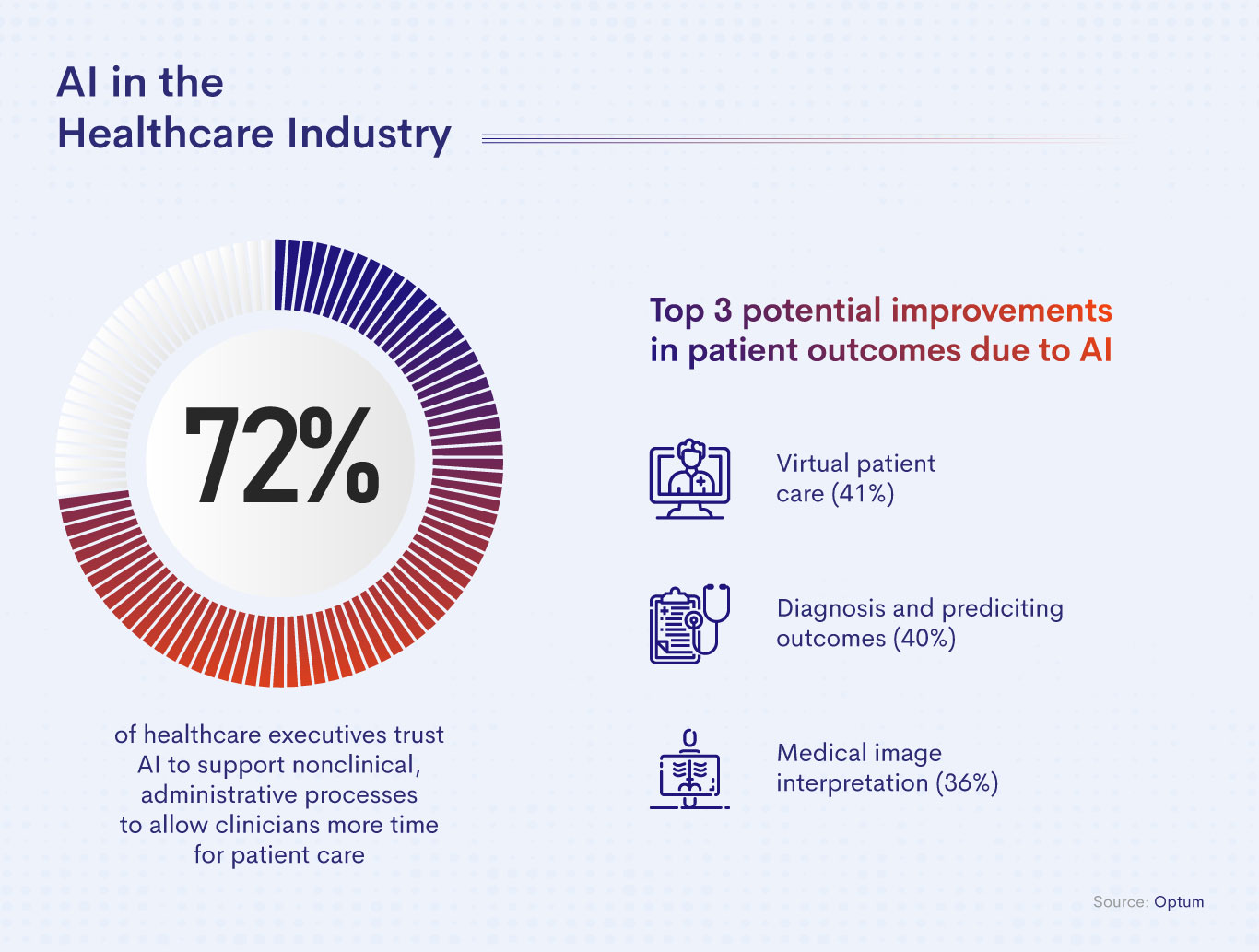- Blog
- May 6, 2024
AI in healthcare industry (Real-World Examples)

- Blog
- May 6, 2024
AI in healthcare industry (Real-World Examples)
The healthcare industry stands at the precipice of a transformation driven by artificial intelligence (AI). For decades, medical professionals have relied on experience and intuition, but AI is ushering in a new era of data-driven precision medicine. From aiding diagnoses and treatment plans to streamlining administrative tasks, AI is poised to transform healthcare delivery and improve patient outcomes.

AI as a Diagnostic Powerhouse:
AI algorithms can analyze vast amounts of medical data, including medical images, lab results, and patient histories, to identify patterns and anomalies that might escape the human eye. This translates to:
- Early Disease Detection: AI can analyze mammograms and other scans to detect signs of cancer at earlier stages, leading to more effective treatment and improved survival rates.
- Improved Diagnostic Accuracy: AI can assist radiologists in interpreting complex medical scans, highlighting areas of concern, and reducing the risk of missed diagnoses.
AI: Transforming Treatment & Personalized Medicine
AI doesn’t stop at diagnosis; it’s revolutionizing treatment planning and paving the way for personalized medicine.
- AI-powered Treatment Recommendations: AI algorithms can analyze a patient’s medical history, genetic data, and current condition to recommend the most effective treatment options, tailored to the individual.
- Precision Dosing & Drug Discovery: AI can analyze vast datasets to predict how patients will respond to specific medications, allowing for personalized drug dosing and minimizing the risk of adverse reactions. Additionally, AI can accelerate drug discovery by analyzing molecular structures and identifying potential drug candidates.
Beyond Diagnostics & Treatment: AI Streamlines Healthcare Operations
The impact of AI extends beyond doctors and diagnoses. AI can streamline administrative tasks and improve overall healthcare efficiency:
- Automated Scheduling & Appointment Reminders: AI can automate appointment scheduling and send personalized patient reminders, reducing no-shows and optimizing clinic schedules.
- Medical Coding & Reimbursement Automation: AI can automate tedious medical coding tasks and handle insurance claims processing, freeing up staff time and reducing revenue cycle management inefficiencies.
Real-World Examples of AI in Healthcare
- Scion Health uses AI to automate medical coding and billing processes, improving accuracy and efficiency for healthcare providers.
- Zocdoc utilizes AI to connect patients with doctors and schedule appointments online, offering a convenient and efficient way to access healthcare services.
- GE Healthcare is using AI technology for enhanced oncology solutions.
- Topcon Healthcare, Inc has invested in an AI-powered eye diagnostics solution.
- Virtua Health is implementing AI-enabled virtual care solutions for patients.
The Ethical Considerations of AI in Healthcare
As with any powerful technology, AI in healthcare comes with ethical considerations. Issues like data privacy, bias in algorithms, and ensuring human oversight require careful consideration. However, the healthcare industry can leverage AI for a healthier future by implementing responsible AI practices and prioritizing patient well-being.
Conclusion
AI is no longer a futuristic concept; it’s a reality transforming the healthcare landscape. By harnessing the power of AI for diagnostics, treatment planning, and operational efficiency, the healthcare industry can deliver better patient care, improve outcomes, and pave the way for a more personalized and data-driven approach to health.




